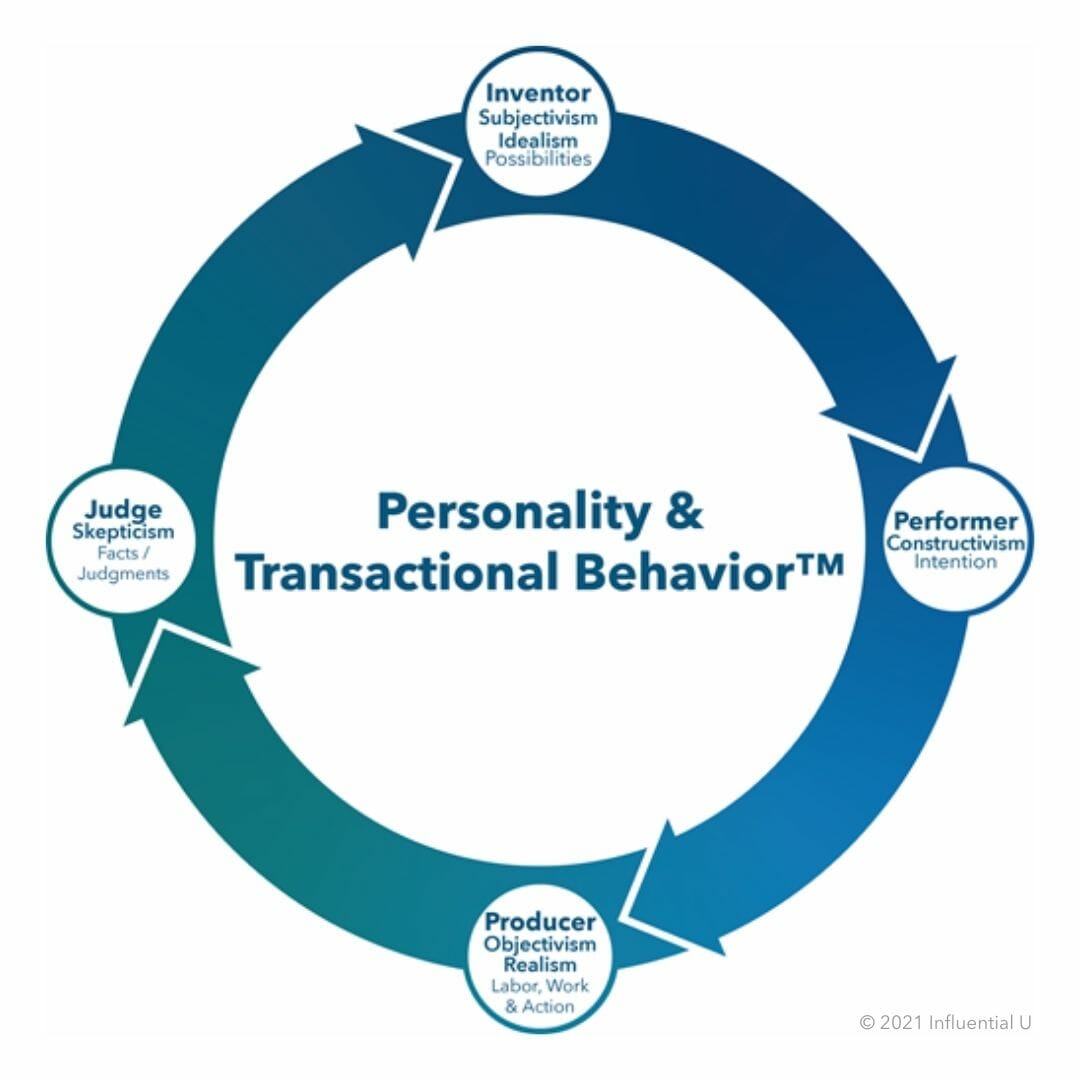The wait is over. Our personality quiz is here. Discover your inner influential superhero — and its kryptonite. It’s a quick online quiz that offers an easy onramp to the business philosophy behind Transactional Competence. The quiz introduces first-timers to the Transaction Cycle by showing them their place in it. It reveals both the superpowers and kryptonite of their transactional personality.
We developed a new tool we call our Superpower / Kryptonite Quiz.
The quiz is a means to indicate your Personality and Transactional Behavior™ and to demonstrate how relevant this model is to everyday exchanges. The quiz is not meant to merely leave you with an understanding of yourself; it easily modifies how we work together and removes friction and dysfunction.
About Personality and Transactional Behavior
What is Personality and Transactional Behavior, and how does it apply to everyday transactions? Throughout most of human history, it has been said that human beings generally fall into one of four basic personality or behavioral types or temperaments. The earliest record of this was written in 400BC by Hippocrates, who noted that the four basic temperaments of human behavior were:
- idea-oriented
- theory-oriented
- action-oriented
- fact-oriented
Influential U has gathered and studied over 220 personality models, most of which have their basis in a four-quadrant model.
We offer this personality framework as a foundational orientation to transactional competence; different personalities approach exchanges according to their worldview within the groups we occupy. The truth is, each personality is has a different job to do, and each role is necessary for the collective group to thrive. In the diagram below, each personality is shown along with its primary worldview and natural role in any transaction. Similar to a relay race, each personality can carry/lead/influence the transaction for a bit then pass it on.

It is posited that we are a eusocial species* where different individuals have different jobs to do. There is a division of labor where generations overlap, occupy the same ecology, and cooperate to care for the young. For example, an ant colony includes a Queen (reproduce), Workers (hunt/protect), Drones (mate), and Alates (establish new colonies).
While born genetically similar, environmental triggers evoke genetic switches to produce the perfect balance of the required roles.
Each role allows the collective group to thrive.
No one role has supremacy.
While human beings are more complex in their environmental responses than ants, perhaps it is useful to consider a similar framework in our fundamental transactions; within the groups we occupy, different individuals have different jobs to do and each role allows the collective group to thrive.
Some transact using a currency of innovative new ideas about the future; some influence relationships with compelling stories; some advance deadlines with consistent activity; and some offer evidence that ensures our security.
We find that human transactions include Inventors (ideas), Performers (influence), Producers (deadlines), and Judges (evidence).
Perhaps there is a balance of the required roles in any ecology?
While we generally tend towards one dominant personality, we also exhibit our own unique transactional behavior. We can develop the skills to transact in roles that may not suit our natural ability.
For example, you may be a Producer (deadlines) who has developed skills in Inventor (ideas); we all can reciprocate (transact/exchange) for survival when needed. However, we have found that transactions suffer (as do we) where we dismiss or don’t account for our own or other’s Personality and Transactional Behavior.
Our commitment is to elevate or accelerate your transactional competence. Practicing the application of Personality and Transactional Behavior can give you a superior advantage in meeting your aims.
Superpowers and Kryptonite
Each personality demonstrates assets and liabilities that can accelerate transactions or grind them to a halt.
When the personality aligns with the proper role in the transaction, we accelerate transactions.
- Inventors tend to be future-based, idea-oriented people who are self-reliant and highly subjective in their thinking.
- Performers tend to be present-based, relationship-oriented people who are inclined to be highly flexible in their thinking.
- Producers tend to be short-term and objective in their thinking and are highly work-oriented doers.
- Judges tend to be skeptical people relying on standards, competence, and evidence before taking action.
When the personality is misaligned with the proper role in the transaction, we disrupt transactions.
- Inventors tend to halt transactions with new ideas or a need to control and may avoid/dismiss relationships and judgments.
- Performers tend to halt transactions with relationship concerns or mood campaigns and may avoid/dismiss commitments and facts.
- Producers tend to halt transactions with premature or unnecessary doing and may avoid/dismiss completion and flexibility.
- Judges tend to halt transactions with authoritative evidence or confronting standards and may avoid/dismiss vision and repetition.
Who’s leading? That depends: Where are we in this transaction?
You can achieve more, faster, with less friction and dysfunction. Teamwork isn’t easy because people are people. We each see the world from different points of view. Each view can sometimes work as a superpower—or paralyze like kryptonite.
Back to the ant analogy. We would never consider one role more or less useful, important, or disposable. Each role allows the collective group to thrive. We always know which ant role to call on for laying eggs or gathering food; however, with humans, we tend to consider ourselves qualified for roles or views that may, in fact, produce a problem for others.
Could we deploy our differences in our favor? Could we instead use our differences to remove the friction or dysfunction from our everyday exchanges—including those with our target market?
Again, the quiz is not meant to merely leave you with an understanding of yourself; it easily modifies how we work together and removes friction and dysfunction.
First, we invite you to take the Superpower / Kryptonite Quiz for yourself. Then, we ask that you share it far and wide.
Share it by email, social media, and in person. Share it with friends, family, co-workers, and business pros.
Share it with anyone who is looking for a way to remove a little dysfunction from the world.
Take the Quiz Below
- The term “eusocial” was introduced in 1966 by Suzanne Batra. E.O. Wilson (Harvard) posited that Human Beings are Eusocial animals.



